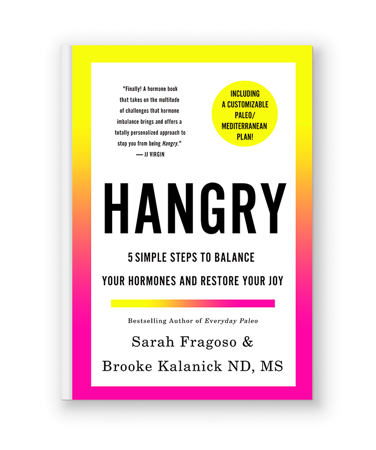
Choosing to breastfeed is a very personal choice for a woman, made based on what she feels is best for her baby, her body and her lifestyle. But I’ll bet you also heard it is an awesome diet.
While I was pregnant, every woman that inquired about whether I would breastfeed or not seemed to respond to my “Yes absolutely” with, “Oh good, the weight just falls off you!”
Sweet! I thought. It sounds like I need not worry about the pressure of “getting back to pre-baby body” as this will be easy! Uh-huh, not for me. In fact, I stayed stuck and super frustrated for almost a year.
Breastfeeding & Your Hormones
Like I mentioned in this post, breastfeeding and menopause have a lot in common for many women. While some women do have a cycle while they breastfeed, many including myself don’t making us low on our sex hormones: estrogen and progesterone.
Without these hormones we can have worse sleep, more mood issues, a frustrating metabolism and difficulty losing weight thanks to the actually quite amazing – albeit frustrating for fat loss – hormone prolactin.
Simply put: high prolactin from nursing will lower your estrogen, lack of ovulation will lower progesterone.
While estrogen dominance gets a bad rap for making us gain body fat, the truth is we need enough estrogen to keep our lean muscle mass. Without it we have a less forgiving metabolism largely due to being more carb sensitive or a bit more insulin resistant. This may mean, much like in perimenopause, you need to rethink your carb intake. This article and my book Hangry will be a huge help for you understanding this.
More about mastering cortisol and insulin, two key metabolic hormones here.
Estrogen also promotes good sleep by nurturing our serotonin levels. Poor sleep will alter cortisol (which in its own right right can make fat loss harder), up our cravings for sugar and starches and let’s face it: if you’re nursing, you’re already getting less sleep! And this lack of estrogen can make it harder to get the sleep you try and squeeze in between nursing.
In addition to low estrogen, if we aren’t ovulating, we also aren’t making much progesterone. Progesterone plays a role in hindering belly fat storage by moderating cortisol’s effect in these fat cells.
The takeaway here is that without estrogen we won’t be tolerating carbs as well and without progesterone we won’t be tolerating stress well either. Think of it as being more carb and more stress sensitive overall so we need to rethink our nutrition strategy and do our best to keep our stress levels in check.
Now I know the lack of sleep and the caring for a new bundle are stressful. You may also be getting back to work. And you’re likely picking back up your exercise routine. All of these things add more stress. Stress gets a very bad rap and in many ways, for good reason. That said a stress free life – especially as a mom – isn’t going to happen….and that’s OK.
Here are a few things that can help:
Understand you’re more stress sensitive due to the low progesterone and lack of sleep, so be mindful of your total stress load. Decrease what you can and reframe the stresses you can’t get rid of….like your baby. It’s Ok to feel all the things: tired, cranky, wishing it were easier AND grateful for your baby. Both can be true.
As well, it’s important to get realigned with what matters most to you so that you can have a better outlook on the stresses that are going to be around. This core value exercise is incredibly helpful – download this FREE exercise, it’s seriously life changing!
And be sure to listen to this episode of the Dr Brooke Show, and this one and this one too, as well where I talk all about reframing our attitude towards to stress to help it work for us, instead of against us. 3 podcasts on rethinking our stress levels? YES! It’s that powerful. I promise these episodes will help you mama, hang in there.
While some stress is inevitable, be sure not to add unneeded stress by over exercising, exercising too intensely, not exercising at all or letting your blood sugar be all over the place by not feeding yourself well. These are easy stresses to avoid. My book Hangry and this program will go a long ways towards helping you work with your hormones in the realm of diet and exercise, especially when things are dicey like during postpartum.
Other stresses that may not seem like stresses but are very common postpartum include: anemia, thyroid problems, autoimmunity (which is often triggered postpartum), poor gut health and inflammation, to name a few can all be easily dealt with and help you get your health, hormones and metabolism back on track. Most can be found with simple blood tests, yet they so often aren’t done.
Email me if you’d like my help! Or if you’re hoping to chat with your GYN about testing, be sure to grab my FREE guide for women’s lab testing right here.
Quick Recap of Your Postpartum Hormone Landscape
Low estrogen and low progesterone will leave you less insulin/carb sensitive and more stress sensitive. As well, lack of sleep and a host of metabolic issues that can get triggered postpartum can have your cortisol wonky (possibly high, possibly low, possibly high at night and low in the morning – the opposite of its normal rhythm leaving you exhausted in the morning and often tired and wired at bedtime). This combo is a tough one for weight loss.
And when we’re exhausted from being up all night, our cravings for carbs and sweets are usually off the chart. When we indulge them, then we’ve added yet another ingredient for tough fat loss: high insulin.
This scenario is the perfect storm for difficult fat loss and easy fat gain, just what a new mom needs huh? And those cravings aren’t just from the lack of sleep. Estrogen normally helps us have more serotonin and dopamine, and progesterone keeps GABA up. Healthy levels of all these brain chemicals keep our cravings at bay. And making matters worse, estrogen normally aids the hormone leptin in regulating appetite.
Order Hangry right now!
If you’ve ever felt like a Hangry B*tch and are ready to balance your hormones and restore your joy in just 5 simple steps then Hangry is for you!
GET YOUR COPY NOW
Dr Brooke, I Don’t Understand…Everything I Read Says Breastfeeding Is Great For Weight Loss
While some women do lose weight easily during breastfeeding, if you don’t the reasons above are likely why. Pair this hormonal picture with common breastfeeding dieting adages like: breastfeeding demands an extra 300-500 calories per day and we can have a fat loss struggle on our hands. This article actually uses the phrase “there’s more leeway for indulgences.”
But given the hormonal picture for many breastfeeding mothers, that advice is a recipe for more weight gain, not weight loss.
Case in point: Dr Brooke. Yup I fell for it too. I read this breastfeeding demands an extra 500 or more calories per day business. I translated that into, “It’s Ok if I eat that cookie or drink that honey chai latte cuz I’ve got 500 extra calories to spare!” This surprised me a bit about myself because I never really gave into the “eating for two” notion during pregnancy. But this caloric leeway coupled with my 1-2 hours on average of sleep per night with my first and I was caving to sugar big time. Not to mention, those first few months with my first baby were among the most stressful of my life.
The lack of sleep; the anxiety, fear and constant wondering, “Is everything OK with my baby??“, trying to run my business and of course the curse of motherhood: am I doing a good enough job?? It’s no wonder we reach for a chocolate bar now and again, it is an incredibly difficult time when hormones and emotions are all over the map.
So like I told myself during those first few months/years – honestly I tell myself this now and that sleepless baby just started middle school – it’s going to be OK. That mantra saves me daily. Take a deep breath and remember to care for yourself as much as you do your baby and work with your hormones to feel better and let your body and metabolism start to find it’s new groove.
Why Its Harder For Some Women
Obviously, not all women experience difficult weight loss with breastfeeding.
Take my friend Leslie who was able to sit back, let the pounds fall off and enjoy her big bosoms. For those of us who found/find fat loss during breastfeeding a really tough struggle, hearing stories like Leslie’s just makes us want to cry. (But what doesn’t make us cry during those first few months??)

It’s important to remember, if your metabolism is stubborn before pregnancy, it likely will be afterwards as well.
This is certainly the case for me. The low estrogen and progesterone make my metabolic issues even worse. So is there just no hope for us? Of course there is, but it helps to get clear on what we’re dealing with.
Order Hangry right now!
If you’ve ever felt like a Hangry B*tch and are ready to balance your hormones and restore your joy in just 5 simple steps then Hangry is for you!
GET YOUR COPY NOW
Given the hormonal landscape of breastfeeding (low estrogen, low progesterone) and the likelihood of less sleep (high cortisol) and potential to be eating more carbs and sweets than we can tolerate (high insulin), you can see where the deck is stacked against us.
Here’s some advice that will help:
- Don’t give yourself a 500+calorie justification for eating not so good for you foods, like me and my honey filled chai lattes. Eat more good foods: more protein, more healthy fats instead of more muffins and ice cream.
- Your time is limited so work out smart: walking with baby napping in stroller, short metabolic circuits at home or your gym for optimal hormonal balancing fat loss. Skip the longer duration cardio and too much intense exercise. Low estrogen makes the long duration stuff less effective and the high cortisol can make the intense stuff back fire.
- Don’t focus on cutting calories or on eating less, your main job really is to nurture your baby – let’s not lose sight of that as we vie for more weight loss.
- Instead focus on more support foods: vegetables and lean proteins; as well as more activity. Move as much as you can. Do 10-20 body weight squats several times per day i.e. while you’re waiting for your tea water to boil, as baby sits there cooing at you, get this core+floor recovery program from Hangry in daily. Dance with your baby. Walk as much as possible instead of driving or park further way (10,000 steps a day is a great goal). Jaunt up and down your staircase quickly and frequently. Play at the park. Live the Dr Brooke Mommy mantra of “Do as much as you can, as often as you can.”
- Consider a lower carb, higher protein diet. The lower carb aspect will keep your insulin more managed while the higher protein intake will keep your calories up and keep you satiated. Overall you’ll likely feel more satisfied and won’t risk dropping calories to low your milk supply drops. Remember, low carb is all relative. Find your unique carb tolerance here.
- Trust that it will likely get easier after you stop nursing. I was pleasantly surprised that my fat loss got so much easier literally the week I stopped breastfeeding. This is a time to own your breastfeeding choice. Sure it may be easier if you weren’t breastfeeding, or hadn’t just had a baby, but these were our choices – for better or worse.
- And skip the guilt. So many women feel wracked with guilt that they are complaining about their bodies while they are also experiencing the joy of a beautiful baby. I’ve fallen prey to this as well, I mean how shallow am I to worry about my waistline when so many women can’t even ovulate well? Here I am with my adorable baby girls and I’m whining about my jeans not fitting?? Both can be true: you can want to feel good about your body again and be insanely grateful for your baby. They aren’t mutually exclusive. But keep perspective and use the gratitude you feel for having your little bundle fuel you to make BETTER choices for yourself when it comes to food and exercise.

It’s easy to be grateful for this little cutie. That gratitude is powerful fuel to keep being BETTER.
- Do that hard, hard thing of making time for yourself. If you’re exercising, eating better and finding a few moments for self care you will be much better able to care for yourself and your family. You deserve a kind internal voice and time for tending to yourself too, don’t forget to prioritize that.
- Finally, some of the lack of progress in your midsection has nothing to do with fat but rather a structural issue. During pregnancy your abs were stretched, your ribs began to flare out to the sides as your growing baby pressed up under your ribcage, and your pelvis likely tipped forward as your low back tried to deal with the big baby belly. All of this postural mess will make your waist look wider – not to mention your core and pelvic floor much weaker.
Although you weren’t prescribed physical therapy the day you left the hospital for all these significant issues, you should’ve been! We all should’ve been. Seek out help or again, simply start with the core+floor recovery plan in my book Hangry.
What If It Is Still Hard?
Pregnancy is no joke when it comes to shifting your hormones. Pre-existing hormonal issues can rear their ugly heads big time after a pregnancy making your postpartum weight loss difficult.
Be sure to keep an eye on a few things:
- Is your cycle now heavier or lighter? Longer or shorter? More painful? Worsening PMS? This can indicate lingering hormonal imbalances.
- Have you had your thyroid thoroughly evaluated? Including being screened for Hashimoto’s. Pregnancy is a very common trigger for autoimmune hypothyroidism (Hashimoto’s).
- There may be nothing “wrong” with you and your doc may say all your labs are fine. While you may not have any disease or overt condition, if you’re struggling and feeling like garbage it’s a great time to find a functional medicine doctor help you sort out more subtle hormonal issues.
- Finally, remember (like I had to) if you didn’t have a six-pack going into pregnancy don’t’ expect to have one 4 months postpartum. We see celebs and other women rocking a bikini a few months after baby and wonder, “Why not us??“

Tuff Girl and breastfeeding mama, Christa here with her beautiful babies and beautiful abs. Christa credits her success with finding the right macro balance and making lots of good choices over and over. This pic is Christa about 6 months postpartum with her third.
I had to remind myself that while Christa’s abs are gorgeous, they’re sorta none of my business. I can be inspired by her, but not compared to her. Comparison that leads to beating ourselves up is useless – work with your hormones, your metabolism and your life. That’s the way to YOUR best post baby body. This was Christa a year after her second baby:
And above all else, don’t forget breastfeeding is temporary. Your body will be your own again some day and what you’re doing for the health of your baby is no small sacrifice.
Find a balance between taking care of yourself, feeling good in your body again and whatever fat loss feels appropriate for you given your hormones and sanity.Most importantly, don’t lose sight of why you wanted to do this in the first place.
You can love your body again, but if you fight the realities of pregnancy and breastfeeding you’ll end up doing all the wrong things: over exercising, under-eating, and making yourself crazy. Try the suggestions in this post, get some coaching from a qualified trainer on your exercise, heal your core and pelvic floor, and if necessary, get some help with your nutrition to both feed baby and move you closer to what you WANT.
Keep nourishment, activity and spirits up! #bettereveryday
Note: I wrote this article after my second baby who turned eight in the summer of 2022. I updated this post to be more helpful, tangible and with more resources for you new mamas with the hindsight of a mom with older kiddos. I can say this: our bodies are forever changed by our babies. This is true and it’s beautiful – and it does not mean you’ll never feel at home or happy with your body.
Honor each stage in your life as a woman by coming to your body with respect for your hormones and work with them: what worked before may not work now. This is true of postpartum and aging in general, women’s hormone are a moving target and we need to stay in tune so we can better understand what works for us.
This is why Hangry was created, what I discuss on the Dr Brooke Show each week, what I write to you about in my weekly emails and what I do in my practice.
Reach out if you need help.
In your corner,
Dr Brooke
Order Hangry right now!
If you’ve ever felt like a Hangry B*tch and are ready to balance your hormones and restore your joy in just 5 simple steps then Hangry is for you!
GET YOUR COPY NOW
